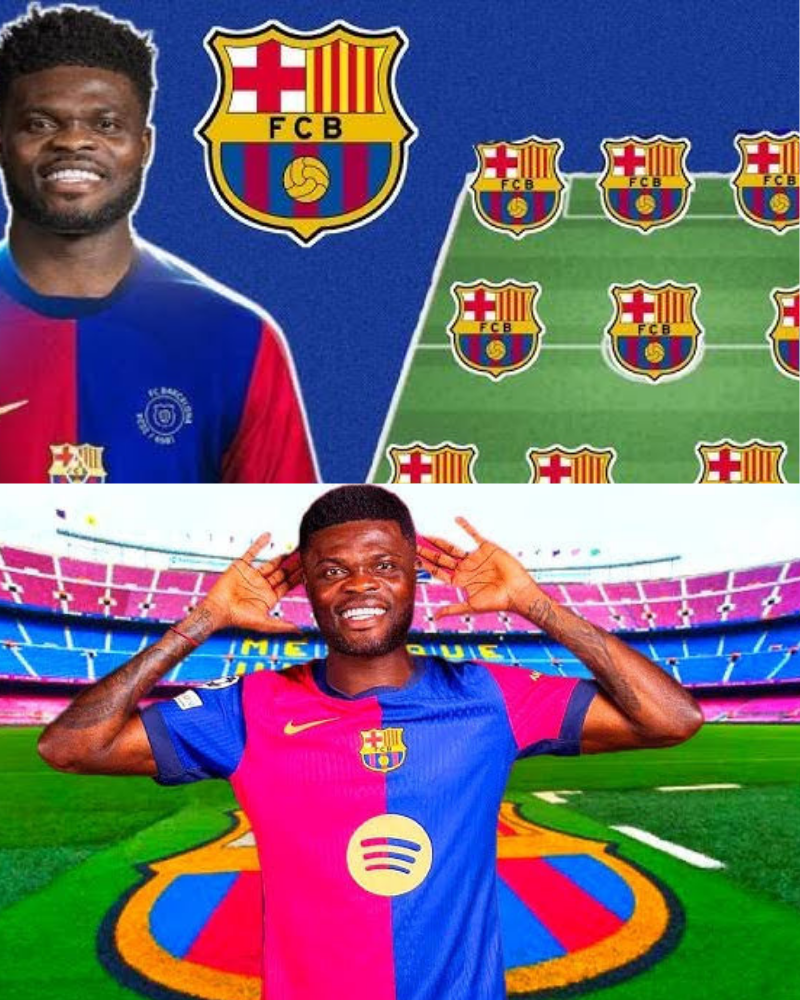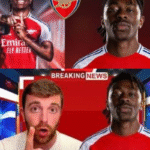Thomas Partey meet with the board for possible contract extentions

The summer transfer window has brought with it a familiar narrative for Arsenal supporters: uncertainty surrounding key players and their long-term commitments to the club. At the center of current speculation sits Thomas Partey, the Ghanaian midfielder whose future at the Emirates Stadium hangs in the balance as contract negotiations reach a critical impasse
Thomas Partey finds himself at a crossroads that has become increasingly common in modern football. The 32-year-old midfielder, who has been a cornerstone of Mikel Arteta’s tactical setup since his arrival from Atlético Madrid in 2020, is entering the final twelve months of his current contract. What should have been a straightforward contract renewal has evolved into a complex negotiation that threatens to end his five-year association with Arsenal.
The situation has reached such a critical point that a face-to-face meeting between Partey and Arteta has been arranged for this week. This meeting represents more than just a contractual discussion; it symbolizes the broader challenges Arsenal face in retaining their established stars while managing a carefully structured wage bill and planning for the future.
According to Nigerian journalist Buchi Laba, who has been closely following the developments, there is currently a 90% probability that Partey could leave Arsenal as a free agent if no agreement is reached. This stark assessment underscores the seriousness of the situation and the urgent need for resolution from both parties
The crux of the disagreement lies in the financial terms of any potential new contract. Arsenal have reportedly tabled an offer that would maintain Partey’s current salary structure of approximately £200,000 per week. For the club’s hierarchy, this represents a fair and reasonable proposal that acknowledges Partey’s contribution while maintaining fiscal responsibility.
However, Partey’s representatives view the situation differently. They argue that their client’s continued importance to the team, demonstrated through his performances in the 2024-25 season, warrants an increase in his weekly wages. This perspective is not without merit when considering Partey’s statistical contributions and his role in Arsenal’s recent successes.
The midfielder’s camp has made it clear that they consider the current offer insufficient recognition of his value to the squad. This stance reflects a broader trend in modern football where players and their representatives increasingly leverage their importance to secure improved terms, particularly when approaching the latter stages of their careers.
Arsenal’s position, described by sources as viewing their proposal as “very solid,” suggests a disciplined approach to wage structure management. The club appears unwilling to deviate from their valuation, potentially setting a precedent for future negotiations with other key players.
Partey’s 2024-25 campaign provides compelling evidence for both negotiating positions. His participation in 35 Premier League matches and 51 games across all competitions demonstrates his fitness and reliability, addressing previous concerns about his injury record that had plagued earlier seasons at Arsenal.
The midfielder’s contribution of four goals and three assists might appear modest on paper, but these statistics fail to capture his true impact on Arsenal’s play. Partey’s role as a defensive midfielder involves responsibilities that extend far beyond goal contributions. His ability to break up opposition attacks, distribute the ball effectively, and provide stability in midfield has been crucial to Arsenal’s tactical framework under Arteta.
Arsenal’s second-place Premier League finish and their impressive run to the Champions League semi-finals can be partially attributed to Partey’s consistent performances throughout the season. His presence in the starting lineup has often coincided with Arsenal’s best performances, suggesting his importance extends beyond mere statistical analysis.
From Arsenal’s perspective, however, Partey’s age and injury history represent legitimate concerns when considering a wage increase. At 32, the midfielder is approaching the twilight of his career, and the club must balance his current contribution against future planning and financial sustainability
The relationship between Thomas Partey and Mikel Arteta represents one of the most intriguing aspects of this contractual saga. Arteta has consistently praised Partey’s contributions and has publicly hinted at the club’s desire to retain his services. In April, the Arsenal manager stated that “the intention is very clear” regarding Partey’s future, though he deferred final decisions to sporting director Andrea Berta.
This week’s scheduled meeting between the two men carries significant weight. Both parties reportedly wish to continue their professional relationship, but compromise will be essential. The meeting represents an opportunity for honest dialogue about expectations, roles, and the future direction of both player and club.
Arteta’s tactical system has been built around players like Partey, whose ability to shield the defense while contributing to attacking build-up play has been fundamental to Arsenal’s evolution under the Spanish manager. Losing such a key component of his tactical puzzle would force Arteta to reconsider his approach and potentially restructure his entire midfield strategy.
The manager’s influence in this situation extends beyond tactical considerations. Arteta’s personal relationship with Partey and his ability to articulate the club’s vision for the future could prove decisive in swaying the midfielder’s decision. Players often value the trust and confidence shown by their managers, and Arteta’s public support for Partey throughout his injury struggles has not gone unnoticed
Partey’s contract situation has not gone unnoticed by clubs across Europe and beyond. Reports suggest that the midfielder has received “concrete offers” from clubs in Italy and Turkey, with at least one Turkish side prepared to meet his wage demands. This external interest provides Partey with leverage in negotiations while offering him viable alternatives should talks with Arsenal fail.
The involvement of clubs from Serie A adds another dimension to the situation. Italian football has traditionally appealed to experienced players looking to extend their careers in a tactically sophisticated environment. For Partey, a move to Italy could offer the opportunity to showcase his skills in a different league while potentially securing the financial terms he desires.
Turkish football’s growing financial power and ambition have made the Super Liga an increasingly attractive destination for established players. The reported willingness of Turkish clubs to meet Partey’s wage demands demonstrates the global nature of modern football’s player market and the competition Arsenal face in retaining their stars
Perhaps most intriguingly, Partey has been linked with a potential return to former clubs Barcelona and Atlético Madrid. Such moves would offer the emotional appeal of returning to familiar environments while potentially providing the financial and sporting satisfaction he seeks.
Saudi Arabian clubs have maintained their interest in Partey, representing the most lucrative potential destination. The financial resources available in the Saudi Pro League could dwarf any offer Arsenal might make, though the sporting and lifestyle considerations of such a move remain significant factors in Partey’s decision-making process
Arsenal’s approach to Partey’s contract situation must be viewed within the broader context of their squad development strategy. The club’s reported progress in signing Real Sociedad’s Martin Zubimendi for £51 million represents a significant investment in midfield reinforcement that could directly impact Partey’s role and playing time.
Zubimendi, at 25 years old, represents the type of signing that aligns with Arsenal’s long-term planning. His arrival would provide Arteta with additional options in midfield while potentially reducing the club’s dependence on Partey. This strategic consideration may influence Arsenal’s willingness to meet Partey’s wage demands, as they balance short-term retention against long-term sustainability.
The departure of players like Jorginho to Flamengo, along with exits for Kieran Tierney and Raheem Sterling, indicates Arsenal’s commitment to squad evolution under Arteta and sporting director Andrea Berta. This rebuilding phase prioritizes younger talents who can contribute immediately while offering long-term value.
Arsenal’s wage structure philosophy appears to emphasize discipline and sustainability over individual accommodation. This approach, while potentially frustrating for players seeking improved terms, reflects lessons learned from previous periods of financial mismanagement in football. The club’s reluctance to deviate from their valuation of Partey suggests a commitment to this structured approach.
Partey’s situation exemplifies the complex dynamics of modern football contract negotiations. Players approaching the final years of their careers face the challenge of maximizing their earning potential while clubs must balance individual demands against squad harmony and financial sustainability.
The concept of player power has evolved significantly in recent years, with representatives increasingly willing to leverage contract situations to secure improved terms. Partey’s camp appears to be following this playbook, using external interest and his importance to the team as negotiating tools.
From Arsenal’s perspective, maintaining wage structure discipline becomes crucial when considering the broader implications of individual decisions. Granting Partey’s wage demands could set precedents for other players in similar situations, potentially destabilizing the club’s carefully managed financial framework.
The timing of these negotiations, occurring during a critical transfer window, adds additional pressure to both parties. Arsenal’s need for squad stability must be balanced against the risk of losing a key player for nothing, while Partey must weigh the security of a known environment against potentially more lucrative opportunities elsewhere.
Arsenal supporters find themselves in the familiar position of watching a key player’s future unfold in public. Partey’s journey from injury-prone newcomer to reliable performer has endeared him to many fans who appreciate his transformation and contribution to the club’s recent success.
The midfielder’s role in Arsenal’s return to Champions League football and their improved Premier League performances has not gone unnoticed by supporters who understand his tactical importance. His ability to perform in crucial matches and his professional approach during difficult periods have earned him respect within the fanbase.
However, supporters also understand the financial realities of modern football and the need for clubs to make difficult decisions. The potential signing of Zubimendi has been met with excitement, suggesting that fans are prepared for change if it means continued progress under Arteta’s management.
The emotional attachment to players must be balanced against practical considerations, and many Arsenal supporters recognize that no individual player is bigger than the club. This mature perspective reflects the fanbase’s evolution and understanding of modern football’s dynamics.
Arsenal’s handling of Partey’s contract situation can be viewed within the historical context of the club’s player retention strategies. Previous high-profile departures, including players like Alexis Sánchez and Mesut Özil, have taught valuable lessons about the importance of timing and wage structure management.
The club’s experience with aging players on high wages has likely influenced their approach to Partey’s situation. Arsenal’s commitment to avoiding the mistakes of the past appears to be driving their disciplined stance in negotiations, even at the risk of losing a valued player.
The success of this approach will ultimately be judged on Arsenal’s ability to maintain competitive performance while managing their resources effectively. Partey’s situation represents a test case for the club’s evolved transfer and contract strategy under current leadership.
Several scenarios could emerge from this week’s crucial meeting between Partey and Arteta. The most optimistic outcome would see both parties reaching a compromise that satisfies the player’s wage expectations while respecting Arsenal’s structure. This might involve performance-related bonuses or other creative solutions that bridge the gap between positions.
Alternatively, Partey could accept Arsenal’s current offer, prioritizing stability and his established role within the team over financial improvement. This outcome would provide continuity for both player and club while avoiding the disruption of a significant departure.
The possibility of Partey’s departure remains real and could trigger a domino effect in Arsenal’s transfer planning. The club would need to accelerate their pursuit of midfield reinforcements while potentially exploring the market for additional options beyond Zubimendi.l
Should Partey leave, Arsenal would face the challenge of replacing not just his playing ability but also his experience and leadership within the squad. The integration of new signings would become even more critical to maintaining the team’s competitive standards.
Thomas Partey’s contract situation represents more than a simple negotiation between player and club. It embodies the broader challenges facing modern football clubs as they navigate the complex landscape of player retention, financial sustainability, and competitive success.
The outcome of this week’s discussions will have implications extending far beyond Partey’s individual future. It will signal Arsenal’s commitment to their wage structure philosophy and provide insight into their approach to similar situations in the future. For Partey, the decision will determine whether his Premier League career continues at Arsenal or takes him to new challenges elsewhere.
Both parties enter these crucial discussions with valid positions and legitimate concerns. Arsenal’s desire to maintain structure must be weighed against the risk of losing a key player, while Partey’s pursuit of improved terms reflects natural career ambitions. The resolution of this standoff will require compromise, understanding, and a shared vision for the future.
As Arsenal supporters and football observers await the outcome, one thing remains certain: the decision reached will have lasting implications for both Thomas Partey’s career and Arsenal’s continued evolution under Mikel Arteta. The next few days will prove pivotal in determining whether this partnership continues or whether both parties must chart separate courses toward their respective ambitions.















